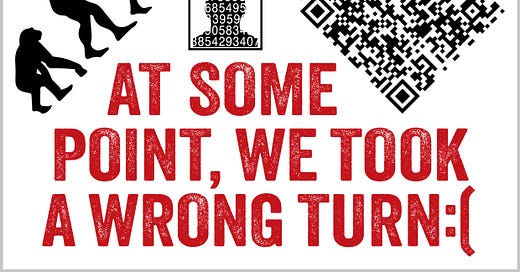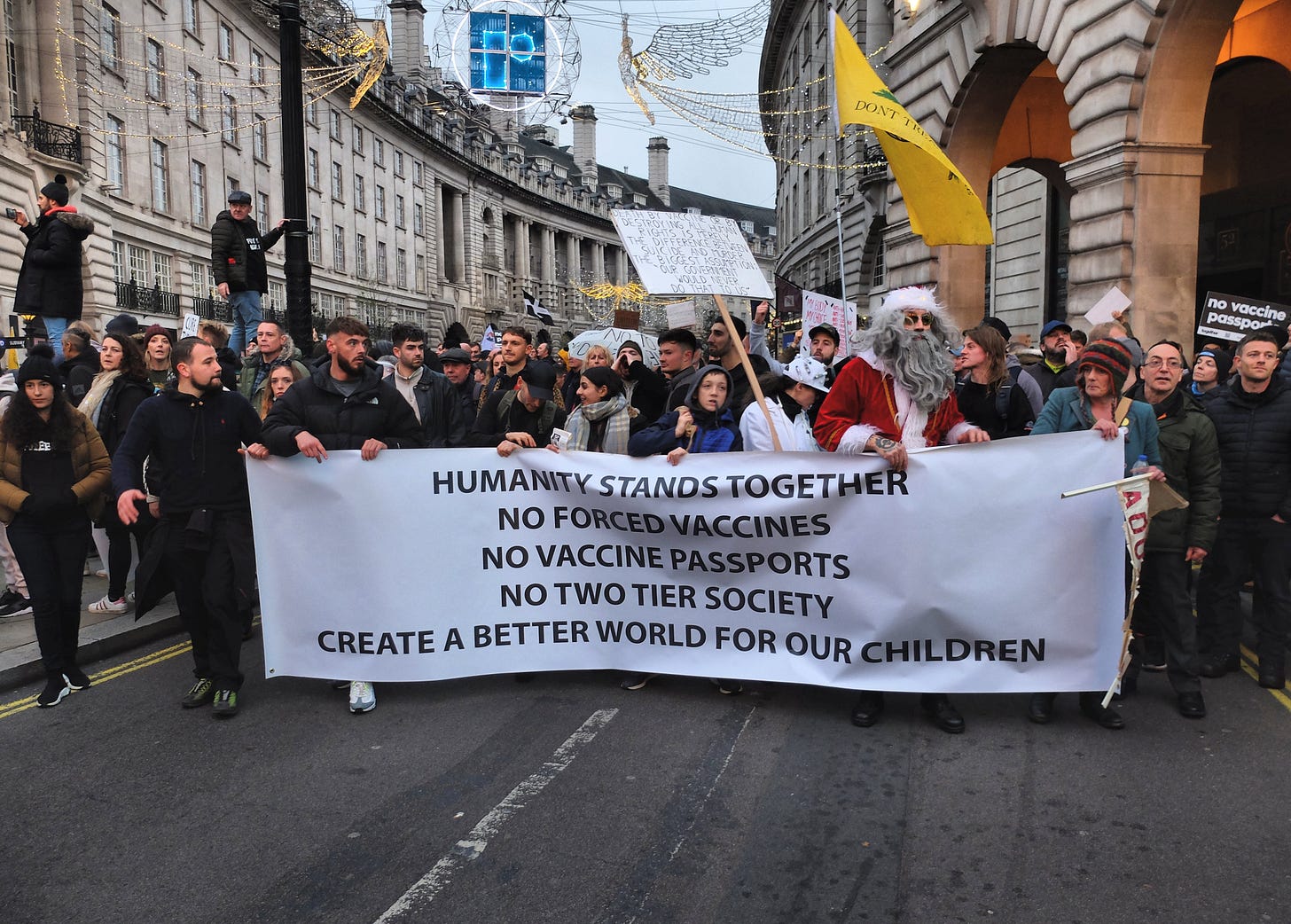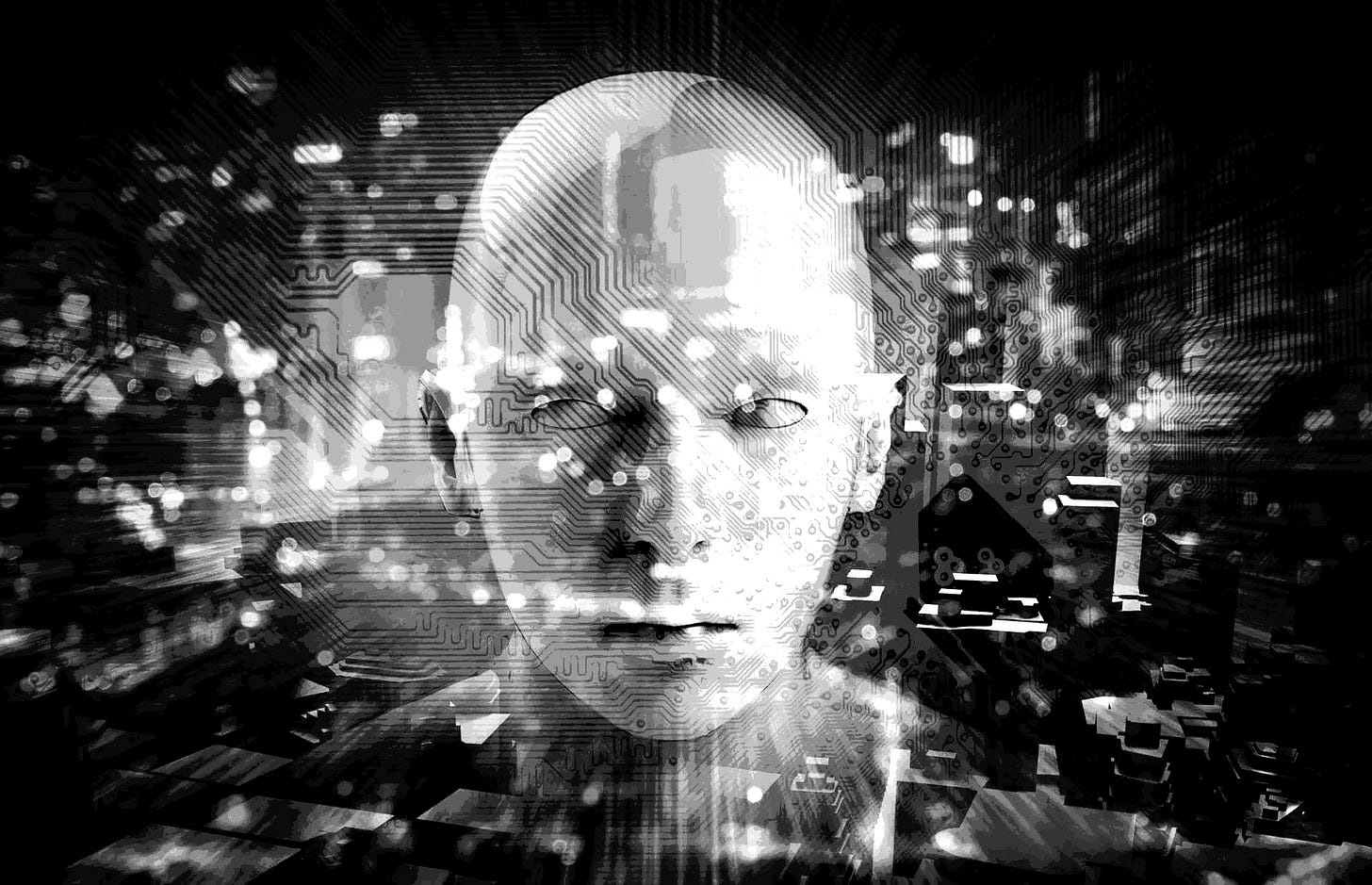Things feel like they have been getting weird for some while now. There are some of those I marched alongside on the anti-lockdown and anti-vaccine mandate protests in 2021 who would pin the start of this weirdness to the start of the Covid 'crisis' in 2020. Other marchers would agree with me that things were starting to get weird a long time before this 'crisis'. What can be agreed upon is that this 'crisis' was an acceleration in this weirdness. Also, as stated by me and a good few others, the 'crisis' was also an acceleration of the implementation of the Great Reset, a.k.a. the Fourth Industrial Revolution.
I've been an activist for more decades than I care to remember. Coming of age in the 1970s, I've also lived through a fair number of crises. Up until the 2000s, these crises were experienced in a very different media landscape to the one we currently find ourselves in. Going back a few decades, I can recall a number of interesting discussions about information overload. With the explosion of social media, some may argue that we're well and truly in the age of information overload. Which is true to a certain extent but, not entirely accurate. Saying that we're in an age of outrage overload and opinion overload would be a more nuanced take on where we are.
The initial hope of the Internet was that it would foster the dissemination of information and open, honest debate. Stop sniggering at the back there! You don't need me to tell you that the initial dream of what the Internet could have been and the toxic shitshow we now have are poles apart.
Far from fostering honest debate, it seems to me that social media has somehow led to a culture of cancelling, name calling, tribalism and blocking.
Whether social media has actually led to this or merely mirrors what's already going on in society is a difficult one to pull apart. What it most certainly has done is amplify this toxic conduct.
What accelerated this was the Covid lockdowns of 2020 and 2021 when restrictions made many people shift their social interactions online. It also made many activists more reliant on the Internet and social media. Four years on from 2020, it really does look as though that shift is permanent. As I wrote many times during 2020 and 2021, online interaction is a poor substitute for real life, face to face interaction. However, it would seem that even though the Covid 'crisis' era restrictions have been parked, that shift to online communication and interaction has a worrying degree of permanency about it.
I'm writing this a couple of weeks after the fourth anniversary of the start of the lockdowns here in the UK has passed. Unsurprisingly, there have been a number of comment pieces in the media (printed and digital) looking back at the lockdowns and trying to assess their long term impact. Worryingly, some of them are looking back at that period with rose tinted glasses...
The impact on those in their teens who had to live through the lockdowns and the resulting isolation cannot be anything but overwhelmingly negative. These are the years when young people start to assert their independence and also, gain the social skills that will see them through adult life.
To be denied the opportunity to do this has to have negative long term consequences for all but the most resilient. Also, as mentioned in this earlier piece - The renegades within our communities 30.3.24 - with the disaffected youths who were allowed to slip through the safety net, we'll be seeing the consequences of that on our streets and estates for years to come.
There does seem to be a lot of collective amnesia when it comes to the Covid 'crisis', the adverse impact of the lockdowns and the rushing through and pushing of an experimental and very questionable mRNA jab. As you go about daily life, superficially on the surface, it looks as though the whole episode never happened and that life today is a continuation straight on from 2019 with the events 2020 and 2021 simply being swept under the carpet. For sure, a lot of people in what some have dubbed the 'truth movement' still talk about what happened a lot, mostly in order to draw attention to the wrongs that were inflicted upon us during 2020 and 2021. For everyone else, it's like it never happened.
You don't need me to tell you that what happened in 2020 and 2021 with the lockdowns, the snitching on anyone daring to defy the restrictions that were imposed upon us, the ostracism of anyone questioning the narrative we were being fed at the time, the intense pressure to take an experimental mRNA jab was very weird and more than a bit dystopian. You also don't need me to tell you that what happened has left its scars on a lot of us. Whether that's from the lost friendships because some of us dared to question the narrative, the crushing loneliness of the isolation many people had to endure as a result of the lockdowns and the restrictions, through to the adverse impacts of taking an experimental mRNA jab, a lot of us have suffered. Yet when we still try to highlight the wrongs that were done to us and seek some kind of recompense, we end up being told to 'move on'.
The weirdest part about this for me, and possibly for many others, is the collective amnesia. How people can simply move on from what happened in 2020 and 2021 by simply appearing to forget about it is baffling to say the least.
Mind you, some of that could be down to the fact that understandably, people to tend to try and move past trauma by relegating it to the recesses of their memories. That is a kind of a coping mechanism and I think for a lot of ordinary people, that's what has happened.
Unfortunately, because of a health condition that came to light at the start of this year, I've had to spend more time than I would like at the doctors surgery and subsequently, at the hospital for an operation. The last few months have brought me into very close contact with the National Health Service here in the UK. Having spent a lot of time in a hospital, you could be forgiven for thinking that 2020 and 2021 never happened. Masking? The only people I saw wearing masks were in the operating theatre. Outside the operating theatre, I didn't see a single member of staff from the nurses through to the consultants wearing a mask. Covid? It simply wasn't mentioned... Whether it's through a sense of guilt, shame or simply embarrassment, as far as a lot of NHS staff are concerned, 2020 and 2021 are simply episodes to be forgotten about. Now that really is weird...
Moving on, the rise of gender identity politics and the toxic rows, cancellations, doxing and intimidation that has come from the more vocal trans rights activists is yet another manifestation of weirdness. One that really does seem to have been massively amplified by the rise of social media.
Even though the links between transactivism and big pharma are there for all to see with only a little work involved, any attempt to point that out is met with a tide of vitriol.
As is any attempt to point out that transactivism is part and parcel of the broader transhumanist agenda - a key component of the Fourth Industrial Revolution. As I wrote in Why do I do this to myself? 12.4.23 it's impossible to establish any kind of meaningful dialogue with people for whom debate and discussion are alien concepts. That's even though a fair bit of the criticism of the TRA agenda is based on the humane principle of doing no harm when it comes to life altering surgeries and medications.
The thing is that there have always been people who have questioned their gender roles and who flouted convention by adopting the mannerisms and garb of the opposite gender: Trans and Gender-Nonconforming Histories - Historic England. We're not talking about anything new here, are we? For the record, I would support anyone questioning the gender roles expected of them, particularly if they're restrictive and shut off life opportunities. The question that needs to be honestly answered is why has this now become a massive industry, with the big pharmaceutical companies pouring an absolute fortune into driving this? Also, given the sheer amount of corporate money that's being poured into this, how can anyone claim that transgenderism is in any way, radical?
The Industry Of Artificial Sex Characteristics And The Dissolution Of Our Human Boundaries - Jenefer Bilek | The 11th hour | 27.2.24
The artificial sex characteristics of the medical-tech industry are no different.
The gender industry operates by deconstructing reproductive sex and commodifying its components, including eggs, sperm, wombs, synthetic hormones, breasts, penises, and vaginas. Children are increasingly exposed to gender ideology in their schools and other learning environments, and on their social media where they spend many more hours than previous generations. They are encouraged to view themselves as commodities rather than wholly, sexed beings. This indoctrination, coupled with exposure to explicit sexual material, contributes to the dissociation from their innate biological reality.
We're back to the thorny issue of social media and what role it plays in social contagion. The jury is still out on this one, with some commentators saying that social media is a big driver of social contagion, while others play down that role.
In the social media is a massive driver of the kind of social contagion that fosters the rise of transgenderism camp, there's this:
Social media harms teens’ mental health, mounting evidence shows. What now? - Sujata Gupta | Science News | 20.2.24
Ironically, one of the most cited studies into this link focused on Facebook.
Researchers delved into whether the platform’s introduction across college campuses in the mid 2000s increased symptoms associated with depression and anxiety. The answer was a clear yes, says MIT economist Alexey Makarin, a coauthor of the study, which appeared in the November 2022 American Economic Review. “There is still a lot to be explored,” Makarin says, but “[to say] there is no causal evidence that social media causes mental health issues, to that I definitely object.”
There are other, more nuanced takes that while acknowledging that more teens than should be are in crisis, argue that putting the blame entirely on social media would be a mistake:
The great rewiring: is social media really behind an epidemic of teenage mental illness? - Candice L. Odgers | Nature - Book Review | 29.3.24
Two things can be independently true about social media. First, that there is no evidence that using these platforms is rewiring children’s brains or driving an epidemic of mental illness. Second, that considerable reforms to these platforms are required, given how much time young people spend on them. Many of Haidt’s solutions for parents, adolescents, educators and big technology firms are reasonable, including stricter content-moderation policies and requiring companies to take user age into account when designing platforms and algorithms. Others, such as age-based restrictions and bans on mobile devices, are unlikely to be effective in practice — or worse, could backfire given what we know about adolescent behaviour.
While we've had the Internet since the mid 90s onwards, we've had social media in the form that we know it for less than fifteen years. While that's a very short period in our history, there's no denying that is has had a profound effect on how we communicate and interact with each other.
With such a profound change in such a short period of time, it's difficult to adequately understand the changes in how we interact with each other. Suffice to say, my gut feeling is that it's not leading us in a good direction.
Is this me suffering from a bad case of future shock or have things accelerated to a hitherto unknown point of weirdness, with worse to come? I'm pretty certain there are a fair few people, some of them former comrades, who will happily state that I'm suffering from a form of future shock! With the advent of the Internet, there are many more sources of news and commentary, mainstream, independent and alternative than we ever could have dreamed of just thirty years ago. With the Internet, news, commentary, opinion and outrage spread at a speed that would have been unbelievable just thirty years ago.
So yes, information overload and the aforementioned outrage overload is definitely a feature of modern life. Is this the cause of the sense of weirdness that's a feature of modern life? Or is it the case that the Internet reflects the weirdness that was already there? The truth is probably somewhere between the two, albeit the Internet and social media in particular contribute in quite a few ways to the self reinforcing loop of weirdness and dystopia.
As for the question 'are things getting really weird?' the answer has to be an emphatic yes! Not only are things getting weird, they're also getting more dystopian.
We can argue as much as we want about the way this sense of weirdness may or may not be getting amplified by social media and communications technology but that would be a distraction from looking the problem right in the face and dealing with it head on. We've become so divorced from the natural world that sustains us and in an atomised world, from each other, it's no wonder that things are getting weird. We're in danger of losing track of what it is that makes us truly human and allowing ourselves to be sucked into an alienating, digitised world where we're subjected to a constant bombardment of distraction while everything thing we do and say is increasingly monitored and controlled. All in the name of the Fourth Industrial Revolution which aims to turn us into digital serfs while the elites accumulate ever more power and wealth for themselves.
The thing is that people are waking up to this. From the opposition to the lockdowns and restrictions foisted upon us during the Covid 'crisis' through to the increasing questioning of gender identity politics to name just two examples, people are starting to fight back. The elites know this which is why they're trying to double down in a bid to retain control of the narrative. It's this doubling down that's contributing to this sense of weirdness, unease and anxiety. That's partly because we can't predict how elites slowly getting backed into a corner are going to react when they know their game is up.
We have everything to gain by rising up while the elites have everything to lose. What we have to remember is that there are many, many more of us than them...











“Far from fostering honest debate, it seems to me that social media has somehow led to a culture of cancelling, name calling, tribalism and blockin”
I hope they don’t unleash the trolls to Substack, causing it to diminish 🙏✨💜
The ‘weird’ world is like living in a cult, and I lived in one for 10 years.